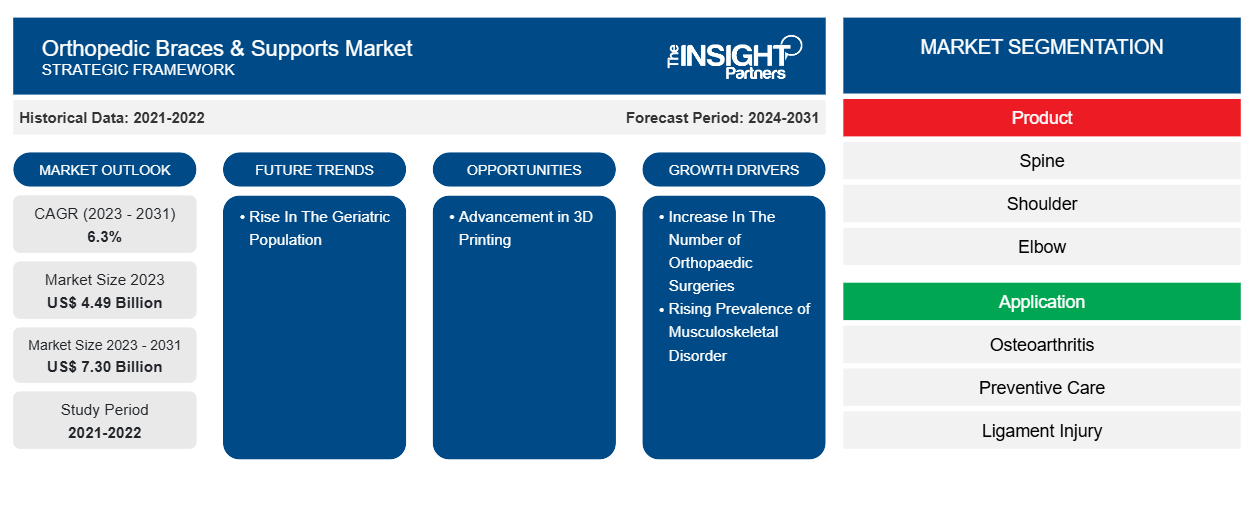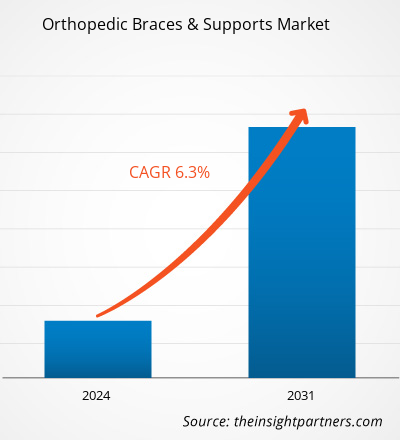Orthopedic Braces & Supports Market Key Companies and SWOT Analysis by 2031
Orthopedic Braces & Supports Market Size and Forecast (2021 - 2031), Global and Regional Share, Trend, and Growth Opportunity Analysis Report Coverage: By Product (Spine, Shoulder, Elbow, Back & Hip, Knee, and Ankle & Foot), Application (Osteoarthritis, Preventive Care, Ligament Injury, Cold Bracing, and Others), and Geography
Historic Data: 2021-2022 | Base Year: 2023 | Forecast Period: 2024-2031- Report Date : Apr 2026
- Report Code : TIPMD00002361
- Category : Life Sciences
- Status : Data Released
- Available Report Formats :


- No. of Pages : 150
The orthopedic braces & supports market size is projected to reach US$ 7.30 billion by 2031 from US$ 4.49 billion in 2023. The market is expected to register a CAGR of 6.3% during 2023–2031. Technological development such as adoption of anatomical modelling software and hypoallergenic materials for improved product design accuracy and efficiency are likely to remain key trends in the market.
Orthopedic Braces & Supports Analysis
The orthopaedic braces and supports market is being driven by technological improvements, an increase in the number of sports and accident-related injuries, a rise in the geriatric population, and a growing public awareness of preventive treatment. These variables help to produce creative goods and solutions that improve patient outcomes. For example, according to the, Population Reference Bureau, the number of people aged 65 and over in the US would increase from 58 million in 2022 to 82 million by 2050. The incorporation of orthopaedic consultations and device recommendations into telehealth platforms and demand for personalized orthopaedic braces and supports represents an expanding opportunity.
Orthopedic Braces & Supports Overview
The orthopedic brases and support products are used for the injury rehabilitation, injury prevention, osteoarthritic care, post-operative care and more. The braces and supports are available in the form of knee braces, ankle braces, leg braces, elbow braces, tennis elbow braces, wrist braces, thumb, hand splints, neck, back and shoulder braces and more. Moreover, Athletes people regularly utilize orthopaedic braces to prevent injuries and aid in the recovery process. Patients' increased preference for non-invasive treatment options over surgery is driving up product demand and providing a non-surgical solution for a wide range of musculoskeletal disorders. According to CDC, osteoarthritis affects over 32.5 million US adults. Braces for osteoarthritis may help improve symptoms, mobility, function, and quality of life.
Customize This Report To Suit Your Requirement
Get FREE CUSTOMIZATIONOrthopedic Braces & Supports Market: Strategic Insights

-
Get Top Key Market Trends of this report.This FREE sample will include data analysis, ranging from market trends to estimates and forecasts.
Orthopedic Braces & Supports Drivers and Opportunities
Rising Prevalence of Musculoskeletal Disorder to Favor Market
The increasing prevalence of musculoskeletal disorder, as well as the growing geriatric population, drive up the demand for orthopaedic procedures. For example, according to a September 2021 article in the Journal of Orthopaedic Science, approximately 4052 knee arthroplasties will be performed on males aged 40 to 64, 6942 on men aged 65 to 74, and 14,986 on men aged 75 and older in Japan by 2030. Moreover, according to the National Safety Council, in the US ~440,000 exercise and exercise equipment injuries were reported in 2022. Thus, the predicted increase in hip and knee operations in the population raises demand for braces and supports that help patients walk, propelling the market forward.
Advancement in 3D Printing
Advances in 3D printing and digital scanning technologies have made it possible to design custom-fit orthopaedic devices based on an individual's anatomy and needs. Healthcare practitioners use digital scans of a patient's spine to produce detailed 3D models that will guide the printing process. Personalization improves patient comfort and treatment outcomes, making it a huge commercial opportunity.
Orthopedic Braces & Supports Report Segmentation Analysis
Key segments that contributed to the derivation of the orthopedic braces & supports analysis are product and application.
- Based on product, the orthopedic braces & supports is segmented into knee, back & hip, shoulder, elbow, foot, and ankle and spine. The knee segment held a largest market share in 2023.
- By application, the market is segmented into ligament injury, osteoarthritis, preventive care, cold bracing and others. The ligament injury segment held the largest share of the market in 2023.
Orthopedic Braces & Supports Share Analysis by Geography
The geographic scope of the orthopedic braces & supports report is mainly divided into five regions: North America, Asia Pacific, Europe, Middle East & Africa, and South & Central America.
North America has dominated the market. The market growth in the region is attributed to the increasing geriatric population, growing developments by the market players for orthopedic braces and supports, growing awareness about product availability, and rising adoption of orthopedic braces to offer mobility and prevent further injury in the ligament.
Orthopedic Braces & Supports
Orthopedic Braces & Supports Market Report Scope
| Report Attribute | Details |
|---|---|
| Market size in 2023 | US$ 4.49 Billion |
| Market Size by 2031 | US$ 7.30 Billion |
| Global CAGR (2023 - 2031) | 6.3% |
| Historical Data | 2021-2022 |
| Forecast period | 2024-2031 |
| Segments Covered |
By Product
|
| Regions and Countries Covered |
North America
|
| Market leaders and key company profiles |
|
Orthopedic Braces & Supports Market Players Density: Understanding Its Impact on Business Dynamics
The Orthopedic Braces & Supports Market is growing rapidly, driven by increasing end-user demand due to factors such as evolving consumer preferences, technological advancements, and greater awareness of the product's benefits. As demand rises, businesses are expanding their offerings, innovating to meet consumer needs, and capitalizing on emerging trends, which further fuels market growth.

Orthopedic Braces & Supports News and Recent Developments
The orthopedic braces & supports is evaluated by gathering qualitative and quantitative data post primary and secondary research, which includes important corporate publications, association data, and databases. A few of the developments in the orthopedic braces & supports are listed below:
- OrthoPediatrics Corp. acquired Boston Orthotics & Prosthetics. This acquisition enables OrthoPediatrics Corp to serve more patients as an extension of our growth strategy to surround the pediatric orthopedic surgeon customers with the most comprehensive portfolio of pediatric orthopedic treatment devices (Source: OrthoPediatrics Corp, Press Release, Jan 2024)
- dj Orthopedics, Inc., released a new, multifunctional back bracing system, the BOA (Back Orthotic Appliance). The BOA is designed to address a variety of clinical spinal indications, including post-operative support after spinal fusion and spinal laminectomy, acute and
- chronic low back pain and disc herniation or degeneration. (Source: dj Orthopedics Inc, Press Release, September 2022)
Orthopedic Braces & Supports Report Coverage and Deliverables
The “Orthopedic Braces & Supports Size and Forecast (2021–2031)” report provides a detailed analysis of the market covering below areas:
- Orthopedic braces & supports market size and forecast at global, regional, and country levels for all the key market segments covered under the scope
- Orthopedic braces & supports market trends as well as market dynamics such as drivers, restraints, and key opportunities
- Detailed PEST/Porter’s Five Forces and SWOT analysis
- orthopedic braces & supports analysis covering key market trends, global and regional framework, major players, regulations, and recent market developments
- Industry landscape and competition analysis covering market concentration, heat map analysis, prominent players, and recent developments for the orthopedic braces & supports
- Detailed company profiles
Frequently Asked Questions
Mrinal is a seasoned research analyst with over 8 years of experience in Life Sciences Market Intelligence and Consulting. With a strategic mindset and unwavering commitment to excellence, she has built deep expertise in pharmaceutical forecasting, market opportunity assessment, and developing industry benchmarks. Her work is anchored in delivering actionable insights that empower clients to make informed strategic decisions.
Mrinal’s core strength lies in translating complex quantitative datasets into meaningful business intelligence. Her analytical acumen is instrumental in shaping go-to-market (GTM) strategies and uncovering growth opportunities across the pharmaceutical and medical device sectors. As a trusted consultant, she consistently focuses on streamlining workflow processes and establishing best practices, thereby driving innovation and operational efficiency for her clients.
- Historical Analysis (2 Years), Base Year, Forecast (7 Years) with CAGR
- PEST and SWOT Analysis
- Market Size Value / Volume - Global, Regional, Country
- Industry and Competitive Landscape
- Excel Dataset
Recent Reports
Testimonials
The Insight Partners' SCADA System Market report is comprehensive, with valuable insights on current trends and future forecasts. The team was highly professional, responsive, and supportive throughout. We are very satisfied and highly recommend their services.
RAN KEDEM Partner, Reali Technologies LTDsI requested a report on a very specific software market and the team produced the report in a few days. The information was very relevant and well presented. I then requested some changes and additions to the report. The team was again very responsive and I got the final report in less than a week.
JEAN-HERVE JENN Chairman, Future AnalyticaWe worked with The Insight Partners for an important market study and forecast. They gave us clear insights into opportunities and risks, which helped shape our plans. Their research was easy to use and based on solid data. It helped us make smart, confident decisions. We highly recommend them.
PIYUSH NAGPAL Sr. Vice President, High Beam GlobalThe Insight Partners delivered insightful, well-structured market research with strong domain expertise. Their team was professional and responsive throughout. The user-friendly website made accessing industry reports seamless. We highly recommend them for reliable, high-quality research services
YUKIHIKO ADACHI CEO, Deep Blue, LLC.This is the first time I have purchased a market report from The Insight Partners.While I was unsure at first, I visited their web site and felt more comfortable to take the risk and purchase a market report.I am completely satisfied with the quality of the report and customer service. I had several questions and comments with the initial report, but after a couple of dialogs over email with their analyst I believe I have a report that I can use as input to our strategic planning process.Thank you so much for taking the extra time and making this a positive experience.I will definitely recommend your service to others and you will be my first call when we need further market data.
JOHN SUZUKI President and Chief Executive Officer, Board Director, BK TechnologiesI wish to appreciate your support and the professionalism you displayed in the course of attending to my request for information regarding to infectious disease IVD market in Nigeria. I appreciate your patience, your guidance, and the fact that you were willing to offer a discount, which eventually made it possible for us to close a deal. I look forward to engaging The Insight Partners in the future, all thanks to the impression you have created in me as a result of this first encounter.
DR CHIJIOKE ONYIA MANAGING DIRECTOR, PineCrest Healthcare Ltd.Reason to Buy
- Informed Decision-Making
- Understanding Market Dynamics
- Competitive Analysis
- Identifying Emerging Markets
- Customer Insights
- Market Forecasts
- Risk Mitigation
- Boosting Operational Efficiency
- Strategic Planning
- Investment Justification
- Tracking Industry Innovations
- Aligning with Regulatory Trends





 Get Free Sample For
Get Free Sample For